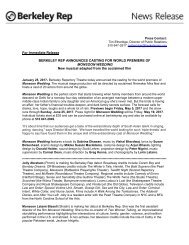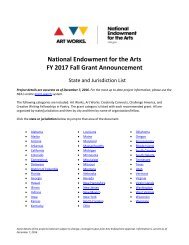BERKELEY
program-ic
program-ic
You also want an ePaper? Increase the reach of your titles
YUMPU automatically turns print PDFs into web optimized ePapers that Google loves.
CONTINUED FROM PREVIOUS PAGE<br />
film. But then It Can’t Happen Here came up, and we thought,<br />
“Hey, forget about that movie; let’s talk about this!”<br />
BC: The material feels connected to my personal history<br />
because my father was blacklisted. He was an electrical engineer<br />
with the Radio Corporation of America and was a union<br />
activist. He was also a member of the communist party.<br />
How would you describe your collaborative process so far?<br />
BC: When Tony and I came into this workshop, we had<br />
certain ideas of what was working and what was not. Then Lisa<br />
came in…<br />
TT: She gave us four pages of notes on the first day. She’s<br />
not afraid to express herself. It’s efficient.<br />
LP: I think that culture of “be direct” comes from you,<br />
Tony. I wouldn’t necessarily be this direct in another situation.<br />
I do admire that about you, and Berkeley Rep. This is a no-nonsense,<br />
just say what you think culture.<br />
BC: That’s the only way to work fast.<br />
LP: Yesterday you were writing, and I was trying some<br />
staging in front of you, which is not easy to do. But it felt okay,<br />
because when you can get the room focused on the thing<br />
we’re making—that’s when, as a director, you can let go of<br />
your own ego—because we know we’re trying to make this<br />
complicated, delicate building. This building is made up of Sinclair<br />
Lewis’ great voice, what was happening in the country in<br />
1935, and what’s happening in the country now. We’re all trying<br />
to bring our best tools and make this thing fly.<br />
TT: I also have to say—we got an Edgerton grant, which<br />
has been fantastic, because it’s what has made this workshop<br />
possible. I mean, the fact that we’re able to have a week to<br />
spend on the text and be able to try radical things a month<br />
before we go into rehearsal! We would be under a different<br />
kind of pressure in the rehearsal hall because the awareness of<br />
having to finalize decisions would have been more pressing.<br />
What may be gained by examining this historical moment<br />
that so closely parallels what’s happening today on the<br />
campaign trail?<br />
TT: There are parts of the book that screamed out that this<br />
is not about a moment in time. This is about a pattern in American<br />
history. Some of the parallels are so eerie that you have<br />
to ask yourself, “What is it about the system, the culture, the<br />
pathology that is endemic to this kind of political development?”<br />
LP: This is a play about what happens when fear guides<br />
you. It’s about xenophobia, it’s about fear-based legislation,<br />
it’s about each man for himself, it’s about what happens when<br />
there is an economic imbalance in a country.<br />
TT: Whatever’s going to happen onstage will be outstripped<br />
by reality. No matter what, it’s not the same historical<br />
moment and this is a piece of fiction. So, the excitement of<br />
getting past that and committing to a play that is more about<br />
America—<br />
LP: —and the difficulties of democracy—<br />
TT: —yes, about the challenges of democracy, and how<br />
people endure and recreate their lives in the face of enormous<br />
fear.<br />
BC: I think what happened last night is as much part of<br />
the parallel—<br />
LP: —five cops got shot in Dallas—<br />
BC: —and two African American men were shot in the<br />
days before by cops and captured on video—that is as much<br />
part of the parallel as the political scene is. It is all a manifestation<br />
of fear.<br />
TT: There’s this great line that the communist character<br />
Pascal has—he says Windrip [the presidential character] is just<br />
something that was vomited up; he’s not the real issue. The<br />
real issue is what vomited it up.<br />
LP: There’s that great opening line in the first paragraph<br />
of the novel about how the stock market crashed in 1929, and<br />
seven years later the country is still reeling. And you know, it’s<br />
all about economics. It’s about money. Maybe we’re in a cycle,<br />
because the country is still responding to an economic crisis.<br />
It’s so weird to have come through, in my opinion, a really quite<br />
wonderful two-term president, an African American president,<br />
feeling like we’ve gotten over the mountain. That is behind us.<br />
Only to realize, no, it isn’t. In fact, it’s lifted the rock up and uncovered<br />
all of our racism, all of our fear, and now we’re feeling<br />
the pendulum swing back—you don’t go only forward. You go<br />
forward and backward, and forward and backward.<br />
The protagonist, Doremus, talks about how he doesn’t<br />
believe in the group, he believes in the individual. How has<br />
that manifested in his characterization?<br />
LP: We really meet Doremus in his study. That is his lair; he<br />
doesn’t like anyone to come in but his dog and he’s surrounded<br />
by all kinds of literature. You learn right away that he’s a reader<br />
and he reads both sides of everything. But he is an island. An<br />
intellectual can surround themselves with books and art but<br />
not know how to engage with the world.<br />
TT: It’s armor. He is smart, as Lisa said; he reads voraciously<br />
and with understanding and challenge, and that becomes a<br />
defining feature of his personality.<br />
LP: He is the editor and primary proprietor of the local<br />
newspaper. It’s not like he is locked away in his bedroom; he has<br />
been the intellectual and responsible voice of this little Vermont<br />
town for years. You know, I’ve been noticing all these references<br />
to sleeping. In the book Doremus’ wife calls him Dormouse.<br />
That’s her nickname for him, no one else calls him that. Dormouse<br />
is the character in Alice in Wonderland who keeps falling<br />
asleep at the table, and so I feel like falling asleep is Lewis’ metaphorical<br />
idea or expression of doing nothing or putting your<br />
hands up in the air and saying, “Someone else will take care of<br />
it. There’s a system of checks and balances in this country. That<br />
person will never get elected.” That’s where the subject of the<br />
story and this moment right now are exactly in sync. Each step<br />
of the way, Doremus is surprised. He’s smart but not realistic.<br />
BC: He’s faced with an imperative in the story that he’s<br />
never been faced with.<br />
TT: Well, he’s forced into it. He’s forced into it the way we<br />
are all going to be forced into it.<br />
LP: There’s a political education; that’s what you’re<br />
watching.<br />
18 · THE <strong>BERKELEY</strong> REP MAGAZINE · 2016–17 · ISSUE 1




